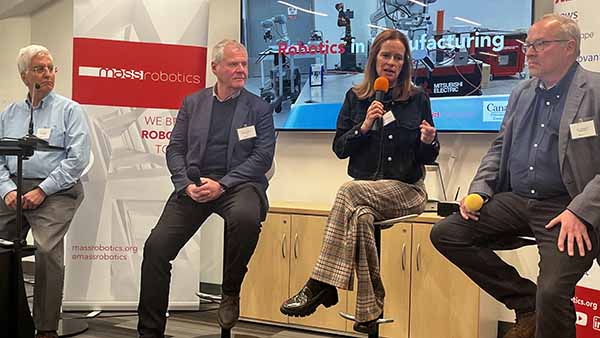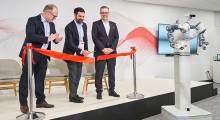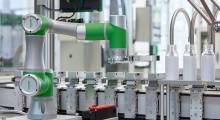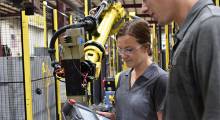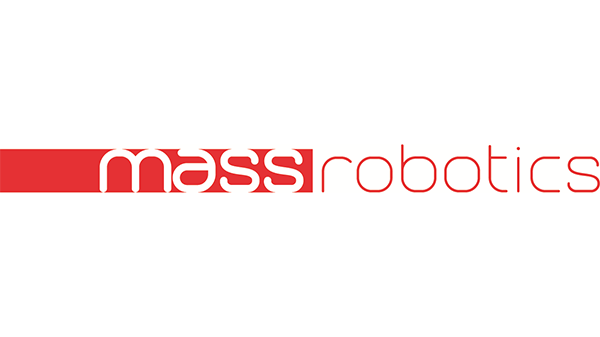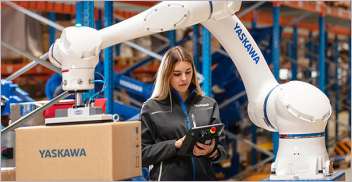Manufacturers looking to invest in automation and other technologies aren’t always aware of the resources available to them locally and on a governmental level. The same could be said of robotics companies looking for capital, mentorship, and networking opportunities.
Last week, MassRobotics, a Boston-based nonprofit that offers co-working space, networking events, and educational workshops, hosted a panel discussion centered on that very topic as part of its “Robotics in Manufacturing” event. The event was a part of MassRobotics’ Signature Series and was sponsored by the Consulate General of Canada.
Peter Russo, MassRobotics vice president of manufacturing support, moderated the panel, which included:
- Jay Douglass, the chief operating officer of the Advanced Robotics for Manufacturing Institute
- Christine Nolan, the director of Massachusetts Center for Advanced Manufacturing for the Massachusetts Technology Collaborative
- Jayson Myers, chief executive officer at Next Generation Manufacturing Canada
The panelists outlined the work being done by their respective organizations and gave insights into where they see advanced manufacturing heading.
Canada’s manufacturing efforts mirror U.S.
Myers noted that Canada's biggest manufacturing customers are in the U.S. And like the U.S., the country is investing heavily in robotics.
“Manufactures are becoming much more like tech companies,” he said, noting that they are using automation to provide customers with end-to-end systems that use multiple kinds of technologies to solve specific problems.
At Next Manufacturing Canada, or NGen for short, the teams there are focusing on providing resources those companies need to succeed, he said. It was founded in 2017 and is in Hamilton, Ontario. It is composed of “private and public sector organizations working together to ensure that Canada is at the forefront of advanced manufacturing,” it said.
Over the past three years, NGen has invested more than CAD $280 million (U.S. $208.3 million), he said.
“And for every dollar we’ve invested, we’re generating about 40 times that amount in terms of sales we generated as a result of those investments,” he said.
Customer expectations, supply chain risks, environmental concerns, and workforce challenges are some key factors driving automation, he explained.
Reshoring starts at the top
Nolan said Massachusetts is following the lead of the federal government and its efforts to bring more manufacturing back to the states.
Based out of Westborough, Mass., the Massachusetts Technology Collaborative is a state agency that provides funding and support to a variety of different industries. The Center for Advanced Manufacturing is a division of the collaborative and is charged with helping support local manufacturers to boost the state economy.
“It [has] a lot to do with robotics and automation,” Nolan said. “Because we know if we are going to reshore, one we don’t necessarily have the people right now, and we want to use robotic and automation because it is allowing us to upscale our talent and really produce the good jobs that create financially rewarding careers for people.”
She noted that semiconductor and microelectronic companies are some of the biggest players investing in automation.
“The amount of money flowing down from the federal government in that space is really driving advanced manufacturing, and we’re responding in Massachusetts and the Northeast very strongly to make sure that we capture that.”
She mentioned the state’s $100 million Massachusetts Manufacturing Innovation Initiative (M2I2), which grants funding to projects being built within Massachusetts that “align with Manufacturing USA institutes and federal priorities.”
She also brought up the Massachusetts Manufacturing Accelerate Program (MMAP), which provides maximum grant awards of about $250,000, with a 1:1 minimum cost share to local manufacturers. The center last week opened up its third round of funding for the program.
Connecting workers with the right resources
Douglass noted that there are more 760,000 open manufacturing jobs in the United States, and part of the reason they aren’t being filled is because of labor and skills challenges.
The Advanced Robotics for Manufacturing (ARM) Institute is in Pittsburgh. It is funded by the U.S. Department of Defense. It has more than 380 partner organizations that work in government, commercial, and educational sectors. The institute has been charged with helping drive developments in robotics and advanced manufacturing.
While the ARM Institute is known for its investments in funding new technologies, it also spends a lot of time developing workforce development programs, Douglass said.
In May 2021, ARM launched roboticscareer.org, an online resource that was designed to help people find robotic training programs near them.
“It has 16,000 training programs on it, and it defines job skill sets in advanced manufacturing,” Douglass said, noting that people can find programs that help them become certified robotics operators.
A lot of the training programs are free because they are being offered by the government, he noted.
Demystifying automation
Smaller companies offer a major market for automation, said Douglass. Part of ARM’s job is to help bring those potential customers in and explain the value of robotics, he said.
“It might be the riskiest thing a company has overtaken so we’re trying to help those people out,” he said.
Some MassRobotics resident startups, including Nano Dimension, Ubiros, Scalable Robotics, and Ascend Robotics, gave brief presentations during the event.
About the Author
Follow Robotics 24/7 on Linkedin
Article topics
Email Sign Up

